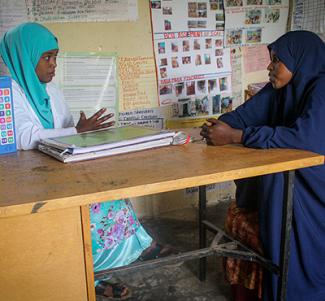Misra Mohamed and Hassam Ahmed have been married for four years and have been blessed with two children--Hakima, their four-year-old daughter, and baby boy Zakir, who is just six months old. Like every mother, Misra wants nothing more in life than to help her children grow up to be strong and healthy so they are able to fulfill their dreams; and like every mother, she receives a lot of information on how to raise healthy children, whether it is neighborly advice from other mothers in the community, or from family members.
However, in Ethiopia, approximately one in every three children suffer from chronic malnutrition (known as stunting), and knowledge and practice of proper nutrition continues to be an area of concern in ensuring the health and well-being of young children across the country.
This is why Misra attends childhood nutrition sessions at her local health post, where counselors and healthcare providers use training they received from the USAID Transform Primary Health Care project to demonstrate nutritious cooking methods using healthy ingredients for women in the community. Families also learn about the importance of feeding children nutrient-rich food--including exclusive breastfeeding for children up to six months old--as well as tips on meal preparation, and additional education on proper hygiene and sanitation in the home.
“Before I attended the demonstrations—like many women in my community—I believed it was beneficial to give cow’s milk to boys and water to girls as soon as they were born. We had no idea we were causing harm as we thought breastmilk would not be sufficient nutrition for them,” remembers Misra. “Since attending the lessons at my health posts, I only provide breastmilk for my son and will now introduce him to solid foods as he has reached six months. In addition, my family now grows potatoes, tomatoes, carrots, kale, greens, pumpkins and onions, and we buy pulses and grains from the market so we can eat a balanced diet,” she says.
USAID’s childhood nutrition interventions help protect mothers like Misra and her young children from illness caused by malnourishment. The project supports task forces and policy development for better nutrition initiatives through the country’s health systems, and has strengthened the skills of healthcare providers across 8,000 health facilities to turn the tide in reducing undernutrition and help families like Misra and Hassam’s live longer, healthier, and more prosperous lives.

